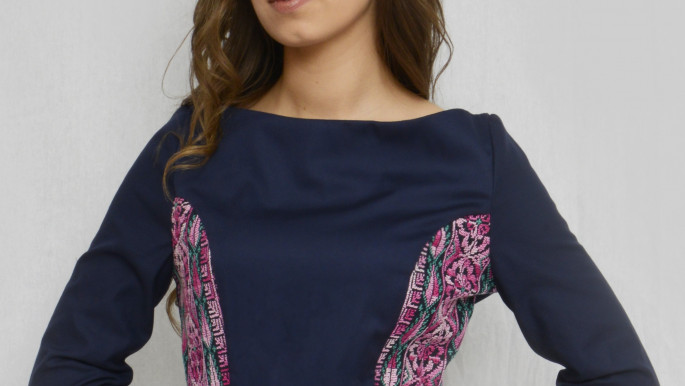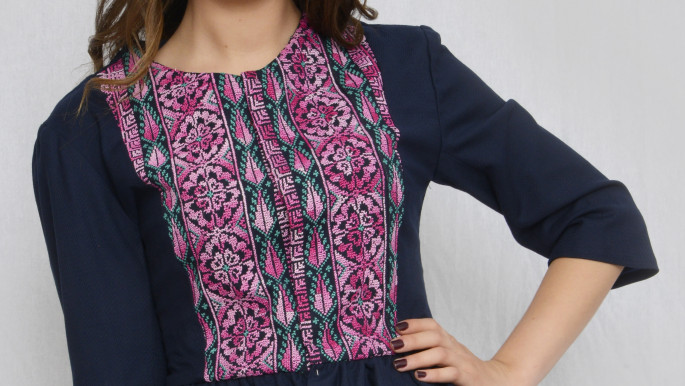Untha: new Jerusalem-based label revives traditional Palestinian fashion
Untha's first collection is characterised by its elegant modern styles. It appears that its rapid success stems mainly from the increasingly popular idea of reviving traditional Palestinian fashion by incorporating unique patterns into modern womenswear.
In pre-1948 Palestine, embroidery was a traditional craft practiced mostly by village women as a way of preserving their identity.
Mothers would teach their daughters their unique patterns and techniques, creating styles specific to certain regions and villages.
Palestinian women in the 19th and early 20th centuries mostly wore clothes with handcrafted rich and colourful embroidery designs, influenced by basic geometric shapes such as squares and triangles, as well as ancient mythology that dates as far back as the Canaanites.
"Working-class women in those villages, having perhaps more free time than spare money, developed locally distinctive ways of making and embellishing dress and head coverings," said Iman Saca in her 2006 study "Embroidering Identity: a Century of Palestinian Clothing".
 |
|
| Untha Spring/Summer 2015. Designed by: Natalie Tahhan Photography: Hala Studio (Mo'nes) Hair & Makeup: Jamil Samara, Model: Nour Bakri |
"Passed from mother to daughter, these embroidered patterns developed into local styles that were maintained for the better part of a century. After a lapse of decades, these traditions are being re-invigorated as a symbol of the Palestinian past."
Tahhan sees embroidery as "a language in itself".
"Each pattern tells a different story.You could tell which village the woman came from based on the pattern she was wearing."
Reviving a dying art
Unfortunately in Tahhan's opinion, embroidery has become a "dying art", still present in some homes, but the skill is not there anymore.
"It is no longer passed down from one generation to another. Very few people have the skill now."
In an effort to reinstill interest in traditional embroidery, the East Jerusalem-based al-Murtaqa Women Organization organised a number of community activities offering classes to teach women the skills of Palestinian embroidery, sewing and fashion design.
Al-Murtaqa hired Tahhan as the lead designer after it took the decision to create the luxury fashion label Untha.
"We only had two months to work on the collection before the show," Tahhan told al-Araby al-Jadeed. "Some of the pieces from the collection did not make it to the show because we did not have enough models."
Made in Palestine
Based in Jerusalem, Untha clothes are made entirely in Palestine. It is inspired by Palestinian heritage and run completely by Palestinians.
 |
|
| Untha Spring/Summer 2015. Designed by: Natalie Tahhan Photography: Hala Studio (Mo'nes) Hair & Makeup: Jamil Samara, Model: Nour Bakri |
According to Tahhan, everyone who worked on the collection and the fashion show is Palestinian, including the models, the hairstylist, and the photographer.
"This was the idea behind the project", said Tahhan, "to be completely Palestinian".
"We wanted to train people to revive traditional Palestinian fashion in a contemporary way."
Materials and fabrics were almost completely locally sourced. Materials that could not be locally sourced were imported from various countries around the world even if they were to be found in Israel.
Tahhan, a Palestinian herself, was born in Jerusalem, where she spent most of her childhood. She studied Fashion Design and Technology at London College of Fashion, before working as a designer at Qatar Museums in Doha for a few years.
She was named as a finalist of Harper's Bazaar World of Fashion Illustration Competition. She is currently based in Jerusalem, where she continues to pursue her passion for art and design.
Untha held its first fashion show last June in Jerusalem, parading stunning designs that received critical acclaim and set off a series of orders from Palestine and several other countries, including Qatar, the UAE, the UK, and the US.





 Follow the Middle East's top stories in English at The New Arab on Google News
Follow the Middle East's top stories in English at The New Arab on Google News


